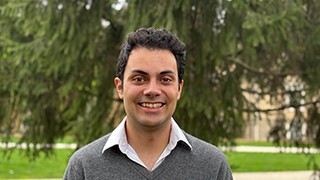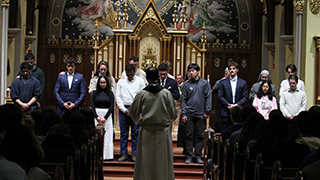New Book by Robert Pallitto, 'Whistle Stop,' Explores Kenny Dorham’s Life and Jazz Legacy
Tuesday, September 9, 2025

Robert Pallitto, Ph.D., J.D., professor of political science in the College of Arts and Sciences
Robert Pallitto, Ph.D., J.D., professor of political science in the College of Arts and Sciences, has a new story to tell, and it sings. Teaming up with his son, John Melendez, Pallitto is preparing to launch their new book, Whistle Stop: Kenny Dorham, Jazz, and the Journey of a Texas Family (University Press of Mississippi, 2026).
Pallitto is no stranger to authorship, “I have published four previous books. Mostly I write about political philosophy and law,” he notes. His earlier works include Bargaining with the Machine: Technology, Surveillance and the Social Contract (University Press of Kansas, 2020); In the Shadow of the Great Charter: Common Law Constitutionalism and the Magna Carta (University Press of Kansas, 2015); Torture and State Violence in the United States: A Short Documentary History (Johns Hopkins University Press, 2011); Presidential Secrecy and the Law (Johns Hopkins University Press, 2007, co-authored with William Weaver).
Yet, this new book explores a very different path. It is a biography that blends close listening with careful history to place the legendary trumpeter, Kenny Dorham, squarely with the American narrative. It is also a father-and-son joint effort, a wonderful project that draws on both writers’ strengths.
Asked why Kenny Dorham, Pallitto starts where many listeners do, with the trumpet. He has long been drawn to the instrument and especially to Dorham’s sound. However, the gap in jazz literature was striking. While other iconic jazz figures such as Miles Davis wrote their own accounts and Thelonious Monk has a major scholarly biography, Kenny Dorham, admired, imitated and foundational, still lacks a full treatment.
As Pallitto and Melendez began interviewing, many musicians responded with enthusiasm. “We interviewed a lot of musicians for this project, and they were all really excited because they loved Dorham and his music so much,” Pallitto recalls. With few of Dorham’s contemporaries still living, many interviewees emphasized the urgency of the work, telling them, “There really needs to be a biography of Dorham’s life.” Pallitto also emphasizes that Dorham’s influence continues today, “There are more people who know his music or were influenced by it than we might expect.”
Furthermore, the pull is deeper than just appreciation. Dorham’s life, as Pallitto argues, “also reflects a lot of things about African American history, from Reconstruction onward.” Thus, Whistle Stop is more than just a biography. It is a vital contribution to the understanding of jazz history and its intersection with American social and political narratives. Accordingly, Pallitto chose not to isolate Dorham on a bandstand. “We tried to look at not only his music but also his family and the challenges they had to deal with in Austin and Freestone County.”

John Melendez, co-author of 'Whistle Stop' and son of Robert Pallitto.
To get the texture right, Pallitto spoke with Dorham's brother “maybe 20 or 30 times,” returning to episodes until they rang true and “shining light on these different points.” The book follows the family’s story from rural Texas to Austin and beyond. In the 1940s, his parents and younger brother moved again, to California, just as Dorham was heading out on his own. Soon after, he went to New York because of the music scene there. A key chapter unfolds with the family’s move happening as he was starting his career as an artist. Two tracks run in counterpoint, migration and music, held together in one narrative.
Pallitto’s goals are clear. “People know him. They love him. But if you mention jazz trumpeters, many will say, ‘oh, Miles Davis.’ I want more people to hear what Dorham contributed on its own terms,” he explains. “This project also resists the kind of history that either simplifies or leaves things out,” Pallitto adds. By attending to what the family went through at different times, including a Texas environment that was not always welcoming, the book keeps context in frame while letting the music speak. “This book serves as a reminder,” Pallitto emphasizes.
As for the collaboration, Pallitto describes coauthoring with his son as both natural and energizing. “We have a strong rapport and we have actually played Dorham’s music together, which made the collaboration especially smooth,” he adds. Alongside this new book, Pallitto notes that his next project will be more closely aligned with traditional political science, focusing on the presidency and the executive branch.
Categories: Arts and Culture






